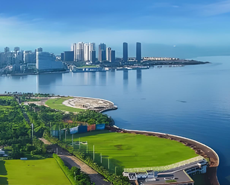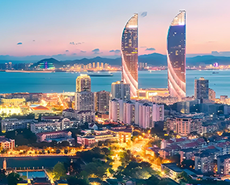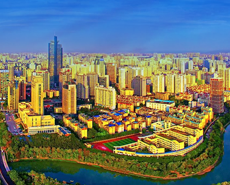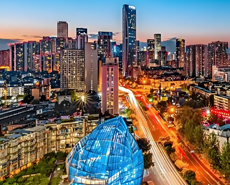Direct supply of secondary aluminum alloy liquid on the trend from cost-saving and environmental perspectives
----Interview with Han Yaobin
Sales Director
Shanghai Shuai Yi Chi Aluminum Alloy New Material Co., Ltd. (CSMET)
Asian Metal: Hello, Mr. Han, thank you very much for accepting this interview from Asian Metal. First of all, would you please give us a brief introduction to your company?
Mr. Han: Established in 2003, Shanghai Shuai Yi Chi Aluminum Alloy New Material Co., Ltd. (CSMET) is a conglomerate of aluminum alloy production, research and development of new materials and transportation of dangerous goods. The company has 5 entity aluminum alloy plants in Shanghai, Suzhou Cangdong, Suzhou Kunshan, Chongqing and Henan and 2 transportation companies of dangerous goods for direct service of liquid aluminum. Based on annual capacity of 350,000t for aluminum alloy at present, the total capacity will reach 450,000tpy in late 2017 with new plants consecutively put into operation. Their products are mainly supplied to main engine plants BMW, Ford, general, Volkswagen, Hyundai, etc. and some auxiliary die casting factories. Since the start of direct supply of secondary aluminum alloy liquid in 2012, the company has become an industrial leader based on abundant experience in quality control and transportation of liquid aluminum. In addition, the company also makes great effort in R&D and has achieved positive results in R&D of new materials, innovation of production process and equipment upgrading. The company owns more than 20 patents at present.
Asian Metal: Mr. Han, you have mentioned that your company supplies aluminum alloy ingot and liquid to some automobile plants and die casting factories in your company introduction. Would you please introduce the major application of aluminum alloy?
Mr. Han: At present, aluminum alloy is mainly used in automobile, communication, hardware tools and other industries. However, with the continuous progress of science and technology and the continuous upgrading of products, the use of aluminum alloy will become more and more widespread.
Asian Metal: What are the proportions for aluminum application in the industries of automotive, communications, hardware tools, etc.?
Mr. Han: The automotive industry accounts for 60-70% of aluminum alloy application, and the communication and hardware industries respectively take part of about 40%.
Asian Metal: Mr. Han, aluminum alloy plants reported weaker downstream demand in 2017 compared with that in 2015 and 2016. What is the reason behind this in your opinion?
Mr. Han: Two factors resulted in this problem. On one hand, it is mainly affected by the automobile consumption policy. In late September 2015, the government carried out policy and measures on vehicle purchase tax reduction, providing preferential tax policy to purchases of passenger cars with discharge capacity of no more than 1.6L. From January 1, 2017, the purchase tax has been raised from 5% to 7.5% for purchases of passenger cars with discharge capacity of no more than 1.6L. Meanwhile, the tax of 10% will be resumed from January 1, 2018, which thus resulted in premature consumption and overconsumption in the market in 2017. On the other hand, the development of new energy vehicles has been accelerated in the past 1-2 years and the use of engines has been reduced. However, secondary aluminum alloy is mainly used in engines and thus the consumption of the alloy decreased to some degree.
Asian Metal: Are there any promising industries that increase the use of aluminum alloys?
Mr. Han: With the improvement and upgrading of lightweight cars, the future is bright for aluminum alloy use in production of auto parts, energy vehicles, furniture and tourism products.
Asian Metal: Could you provide a detail introduction to the application of aluminum alloy in furniture and tourism products?
Mr. Han: As for furniture industry, the use of aluminum alloy mainly focuses on production. As for tourist attractions, some public utilities in tourist attractions are also using aluminum alloys, such as seats for example, which has been common in foreign countries, but it has not yet been popularized in china.
Asian Metal: In the past two years, environmental protection has become more and more strict. Some aluminum alloy plants have been shut down due to incompliance in environmental requirement. Will this affect other alloy and die casting plants?
Mr. Han: The survival of the fittest is the eternal law of the market. Alloy and die casting enterprises will be phased out the market if they are not in line with the industrial norms with incomplete formalities and substandard emissions. Stricter environmental policy can reshuffle the aluminum alloy industry. Some enterprises are kicked out of the industry in the reshuffle, which can facilitate the development of enterprises in line with industrial norms with incomplete formalities and substandard emissions.
Asia Metal: Does the survival of the fittest in the aluminum industry affect the pricing of the industry?
Mr. Han: No effect will be imposed. Orders will flow to large enterprises from small and medium-sized enterprises, but the total demand sees no decrease.
Asian Metal: You have repeatedly mentioned the lightweight of automobile in your previous answers. Can you explain the application of aluminum alloy in lightweight of automobile in details?
Mr. Han: The lightweight of automobile includes full aluminum body, structural components replacement, etc. The production of structural components used in cast iron previously, which will be replaced by cast aluminum in the future.
Asian Metal: You just referred that several plants of your company focus on production of secondary aluminum alloy liquid as auxiliary products. Are there any advantages and disadvantages compared with production of aluminum alloy ingot?
Mr. Han: The direct supply of secondary aluminum alloy liquid has been years in China, which has developed especially rapidly. There are two reasons for this. On one hand, the industrial agglomeration and scale of die casting plants continue to improve. The direct supply of aluminum liquid requires certain consumption from downstream auxiliary plants and the aluminum alloy consumption from a single plant is large, which facilitates the direct supply of secondary aluminum alloy liquid. In context of industrial agglomeration, the consumption from a single plant is minimal, but the total consumption in the whole region is large, which also provides conditions for the direct supply of secondary aluminum alloy liquid. On the other hand, limited by environmental requirement and cost pressure, more and more enterprises choose the direct supply of secondary aluminum alloy liquid. Compared with refusing of aluminum ingot, the supply of aluminum liquid can directly save cost of RMB800-1,200/t (USD118-177/t) in energy consumption, burning loss, labor, maintenance, etc. Meanwhile, as die casting plants use aluminum liquid instead of smelting aluminum ingot, reducing carbon emission and metal burning loss, leading to environmental benefit. For example, our company supplies aluminum liquid for 100,000tpy and downstream die casting plants will reduce smelting 100,000t of aluminum ingot. If the burning loss is 2% per ton, 2,000t of metals can be recycled and meanwhile the consumption of gas can be reduced largely. From the perspective of downstream die casting plants, no consumption and no burning loss will occur if they don’t smelt the 100,000t of aluminum ingot, which will generate environmental and social benefit without energy consumption and large carbon emission reduction. The economic returns will be significant due to higher recovery rate based on less metal burning loss. As for our plants, we conduct centralized smelting, resulting in no increase in carbon emission and burning loss. As a result, the direct supply of aluminum liquid is characterized by low energy consumption, low carbon emission and high social and environmental benefits. However, the transportation radius only covers 150km in China at present, while the figure can reach 350km in other countries. Nevertheless, with improving equipment, it is still possible to realize long distance transportation in the domestic market.
Asian Metal: Will the direct supply of secondary aluminum alloy liquid becomes a trend in the future?
Mr. Han: Yes, it will become a trend in terms of characteristics of cost saving and environmental protection.
Asian Metal: Many companies reflected longer and longer payment days from downstream die casting plants and what are the reasons?
Mr. Han: On one hand, the currency liquidity is insufficient restricted by the overall financial environment. Some downstream enterprises use capital flow to expand production without better channels to obtain capitals, resulting in an occupation of capitals for raw materials. Thus, payment to alloy plants is delayed. On the other hand, the consumption of automobiles grows slowly currently, leading to lower fund recouping for automobile companies and die casting plants are also in pressure to recoup funds. Therefore, the payment from die casting plants to alloy plants is longer and longer.
Asian Metal: Is there any payment term when alloy plants purchase raw materials?
Mr. Han: The payment term is quite short when alloy plants purchase raw material and the payment is usually based on cash.
Asian Metal: Alloy plants sell final products on payment terms at present, but raw material purchases are based on cash payment. Thus, alloy plants are in high capital pressure.
Mr. Han: Yes, they are in high pressure. However, medium and high end consumers intend to conduct business according to contracts and thus the payment won’t be prolonged deliberately.
Asian Metal: However, the number for high end consumers is limited and do you have any suggestions on shortening payment term for alloy plants?
Mr. Han: On one hand, the consumer base should be optimized based on larger number of consumers with high credibility to lower default rates. On the other hand, multiple financing channels should be taken to supplement the funds needed in the production process, such as accounts receivable financing, etc.
Asian Metal: What do you think about the future secondary aluminum alloy market?
Mr. Han: The aluminum alloy industry is a national support sector. With the tightening environmental policy and further advancement of supply side structural reform, the aluminum alloy market will be more healthy and steady. However, the currently aluminum alloy industry is still in surplus supply and the market competition will be relatively fierce within a period. But orderly competition will promote the development of the industry and the future alloy market will move healthily and steadily.
Asian Metal: What about the price trend in the the future?
Mr. Han: At present, the price of A00 aluminum alloy has been hovering in the range of RMB13,500-14,000/t (USD1,986-2,060/t) for long time, which is in difficulty for sharp increases or decreases. The secondary alloy market is relatively stable.
Asian Metal: All right. Thanks again for your interview by Asian Metal. Wish your business thriving!
















